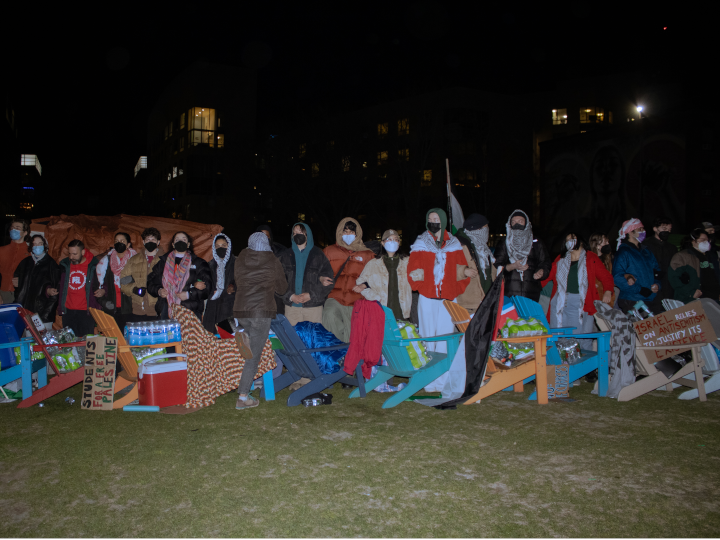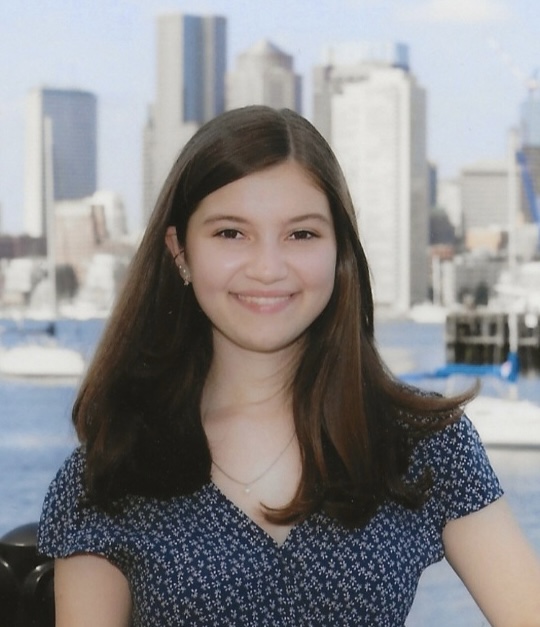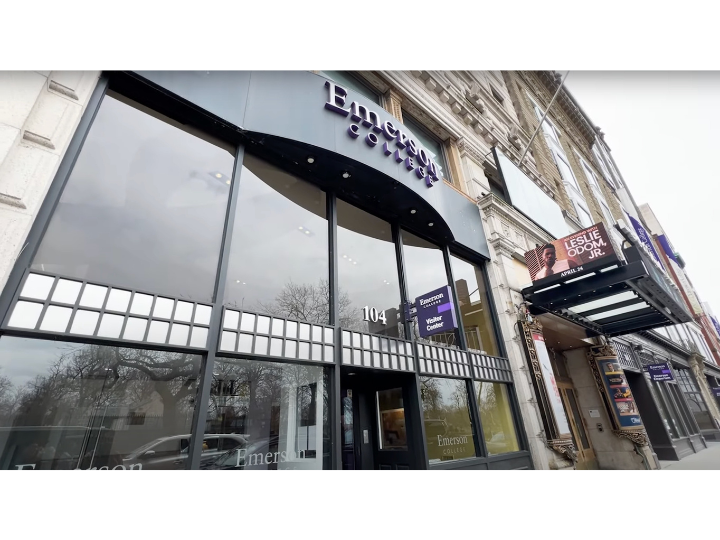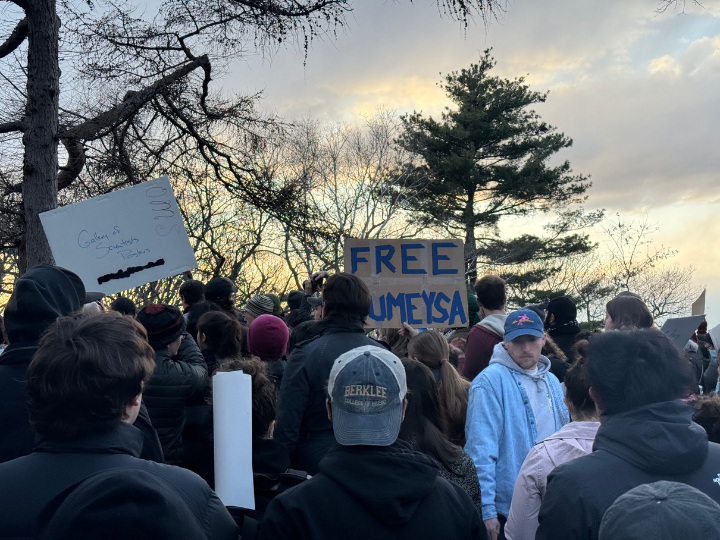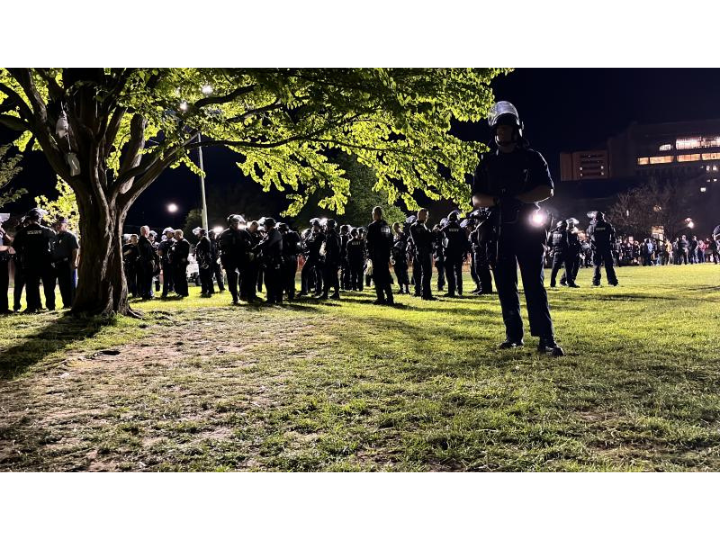Northeastern students divided after encampment and commencement arrests
Northeastern University students feel divided and unsafe two weeks after the disbandment of the Centennial Common encampment. On April 27, 97 people were arrested from the encampment after concerns over antisemitism from the university.
Many pro-Palestinian students faced arrest and university disciplinary action for their participation in the encampment. Pro-Israel students counterprotested the encampment to draw attention to the hostages taken by Hamas, according to student Winston Alcufrom.
Jordan Korgood, a Jewish graduate student who was arrested, joined the encampment to call out the “university admin(istration) for their complicity” and said it was a “beautiful” community that “sprung up to support one another.” They said the encampment had communal bedding, toilet paper, and food and hosted Passover Seders and Muslim calls to prayer.
The main goal of college encampments is to bring attention to Gaza, Korgood emphasized. They said, “Anything we have faced from the police at our schools does not compare to the violence that the civilians of Gaza have encountered over the last seven months.”
During Korgood’s arrest, their hand became “tingly” and “turned white” from the zip ties over their wrists.
Northeastern Hillel Executive Director Rabbi Sara Paasche-Orlow considered the encampment “a disruption more than protesting.” There was “a complete lack of capacity for dialogue” because both Northeastern students and outside community members were in the encampment, she said.
Maya, who asked HorizonMass to only print her first name, is an undergraduate student approaching her fifth year and was arrested. She said the encampment reflected the protesters’ firm stance against the “fear” university administration “created around this issue”—and added that protestors aimed to get Northeastern University to disclose its ties to Israel, to divest from Israel, and “to denounce the genocide currently happening in Gaza.”
Protesters demanded Northeastern divest from Raytheon, a defense company with longstanding ties to the Boston area, and other partners supporting Israel. Raytheon is “a big donor to the school,” according to Korgood, with Raytheon Amphitheater being a building on Northeastern’s campus. Northeastern hosts a co-op program with Raytheon and other defense partners that “very proudly make weapons for the US military that end up going to Israel,” according to recent graduate Ben, who also asked HorizonMass to only print his first name. “The same Raytheon that developed people seeking missiles in the 80s,” said Korgood.
The encampment chants “mean totally different things” than the goals of the encampment, according to Rabbi Paasche-Orlow. “Many parts of the Jewish community” experienced encampment chants as “hateful speech.” Chanting “Free Palestine” does not “express knowledge or understanding that could lead to a future that is more humanitarian for Palestinians and Israeli Jews,” she said.
Winston Alcufrom is a Jewish fifth year Northeastern student who proudly wore an Israeli flag at the counterprotest. Alcufrom participated in the counterprotest because he “do(es) not feel safe on our campus” and to advocate for the release of Hamas’ hostages. He stated the chant “From the river to the sea Palestine will be free” is antisemitic because it calls for the replacement of Israel with Palestine and “expulsion of Israelis from their own land and implies anti-Zionism.”
Some counterprotesters called Jordan Korgood and others “Hitler’s children” and “kapos,” which refers to Jewish prisoners that assisted Nazi soldiers in concentration camps. Korgood considers being called a kapo as “one of the worst things you can call another Jewish person.”
Protesters also chanted “Globalize Intifada,” which Alcufrom considers to be hate speech. He said, “whether they know what that means or not” the chant calls for the “violent” riots and the “target(ing) (of) innocent Israeli civilians” of the Intifada “to reoccur in Israel.”
Korgood chose not to chant about the Intifada because they believe “it’s not the most effective way to liberate.” They acknowledged that some chants “are making some people uncomfortable,” but recognized discomfort as an opportunity to spark dialogue.
Counterprotesters, including Alcufrom, entered the encampment to initiate dialogue between protesting groups. Alcufrom heard protesters repeat “don’t engage” to one another and later chanted, “Free, free Palestine” to his face, “threatening” him.
Although Alcufrom considered Northeastern’s response to the encampment “late,” he said that pro-Israel students “are very happy with the result.” He appreciated that arrests were “nonviolent” and that student protesters face disciplinary action for violating the code of conduct.
Ben said he “was not physically punched or harmed,” during his arrest. Jordan Korgood witnessed one person “pinned to the ground” to be arrested and their own hand turned white from their zip tie, as previously stated.
Rabbi Paasche-Orlow witnessed Northeastern Police encourage protesters to leave the encampment to avoid arrest. Northeastern students were detained and released with proof of university affiliation to receive disciplinary action instead of legal action, she said. This method was “a fair way to administer that” since students were not trespassing, but other protesters were.
“The police revoked” the opportunity to present university identification and be released “before many of us even got the chance to speak with them,” said Jordan Korgood. Korgood was charged with trespassing and rioting. Northeastern University charged Korgood with five Code of Conduct violations, including endangering behavior, disruptive gatherings and violation of university policies.
Ben attended Northeastern commencement on May 5 with a Palestinian flag on his graduation cap and painted one of his hands red. Although Ben protested at the commencement in a “low-risk” role, he said, “It felt good to do more action at such a large event.” He led chants including, “Disclose. Divest. We will not stop. We will not rest,” as one protesting graduate approached the stage before being escorted out and arrested.
Ben and fellow graduates also chanted, “Aoun, Aoun, you can’t hide. You’re supporting genocide,” toward Northeastern President Joseph E. Aoun to promote divestment from Israel.
Graduates should have “allow(ed) Northeastern as a community and the students to celebrate with joy the accomplishment of graduating without it being another site for protest,” Rabbi Paasche-Orlow explained.
On May 6, Maya and many of her fellow Northeastern students began their summer semester. She felt unsettled as she walked past Centennial Common for the first time since her arrest, yet hopeful that the university will meet the students’ demands soon.
Northeastern University must continue its efforts to reestablish safety and community amongst its students, according to Winston Alcufrom. To do that, Rabbi Paasche-Orlow advised that the university host “carefully planned and mediated conversations” for the community “to genuinely be able to be thoughtful together” and “contribute to there being a better future for Israel as well as the Palestinian people.”
This article was produced for HorizonMass, the independent, student-driven, news outlet of the Boston Institute for Nonprofit Journalism, and is syndicated by BINJ’s MassWire news service.

